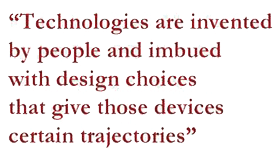 How we think about the relationships between plagiarism detection services, labor issues in higher education, and the teaching of writing calls up broader questions of our responsibilities as teachers of writing and rhetoric. In thinking about responsibilities, I want to draw on digital literacy scholar Laura Gurak's definition of cyberliteracy. Gurak focuses on the ways that "technologies are invented by people and imbued with design choices that give those devices certain trajectories." She advocates an approach to technologies that sees them not as neutral tools but as socially constructed, designed by people and with designs on people. For Gurak, cyberliteracy has an active dimension, which ties back to the notion of responsibility. Cyberliteracy means voicing an opinion about what these technologies should become and being an active, not a passive, participant. As we continue to encounter new digital composing spaces and technologies that automate writing instruction and assessment, we should continue to critically examine those spaces in order to provide the highest levels of theoretically informed writing instruction that we can. Our approach to cyberliteracy needs to incorporate discussions of the political, ethical, material, and sociological issues that surround the creation and incorporation of any new technology.
How we think about the relationships between plagiarism detection services, labor issues in higher education, and the teaching of writing calls up broader questions of our responsibilities as teachers of writing and rhetoric. In thinking about responsibilities, I want to draw on digital literacy scholar Laura Gurak's definition of cyberliteracy. Gurak focuses on the ways that "technologies are invented by people and imbued with design choices that give those devices certain trajectories." She advocates an approach to technologies that sees them not as neutral tools but as socially constructed, designed by people and with designs on people. For Gurak, cyberliteracy has an active dimension, which ties back to the notion of responsibility. Cyberliteracy means voicing an opinion about what these technologies should become and being an active, not a passive, participant. As we continue to encounter new digital composing spaces and technologies that automate writing instruction and assessment, we should continue to critically examine those spaces in order to provide the highest levels of theoretically informed writing instruction that we can. Our approach to cyberliteracy needs to incorporate discussions of the political, ethical, material, and sociological issues that surround the creation and incorporation of any new technology.
Similarly, Ben McCorkle's Rhetorical Delivery as Technological Discourse discusses the importance of examining digital spaces as "sites of resistance," an approach to cyberliteracy that injects aspects of advocacy and activism to our examinations of technologies that affect writing. McCorkle argues that the discipline of rhetoric allows us to consider both the "matter and manner of communication" as we critique emerging technologies and asks us to consider ways to disrupt our natural tendency to render technologies invisible. Throughout this webtext, I have emphasized a critical approach to technologies that asks us to resist the invisibility and naturalization of these spaces. I have argued for an approach to digital composing spaces that asks how these spaces’ affordances and constraints shape the communication that is possible, and attempt to make visible the design choices that rhetorically shape users’ communicative choices in those composing spaces. As corporate spaces like Turnitin.com bring in other commercial entities like the Educational Testing Services and Pearson publishers, we should consider whether those companies’ values are in line with our own, and whether we would prefer to support them financially or support the work that’s going on in our own local contexts—in our own writing programs and writing centers. Hearkening back to McCorkle’s notion of "acts of resistance," we should be pro-active in the conversation about plagiarism detection locally. Frequently, the choice to subscribe to plagiarism detection services happens without the input of the people most impacted by that choice—writing program administrators and writing faculty. Often, we are not even involved in the conversation. We are simply left to think of ways to cope with the institutional presence and impact of Turnitin.
As administrators and faculty members in the field of rhetoric and composition, we study writing. We teach writing and rhetoric. We are ourselves writers. We are the ones on campus who are best poised to articulate well-reasoned responses to plagiarism detection technologies. Especially on campuses where administrators have invested financial resources, faculty lines, and professional development opportunities to enrich the teaching of writing, we need to be involved in the conversation regarding plagiarism detection services before significant decisions are made. We are the ones who are most informed about the teaching of writing—because we have studied it, researched it, and published our findings about it. And most importantly, as writing teachers, we live it every time we enter the classroom, every time we grade and respond to our students' writing, and every time we look ahead to our next courses and craft our syllabi. It is possible to create a classroom setting where issues of academic integrity can be discussed without having to support a billion-dollar entity that emphasizes a rhetoric of fear for students, that over-emphasizes attention to surface issues like grammar and spelling, and that attempts to naturalize machine scoring of essays as authentic assessment.
home ![]() history, page 1
history, page 1 ![]() history, page 2
history, page 2 ![]() other people's papers, page 1
other people's papers, page 1 ![]() other people's papers, page 2
other people's papers, page 2 ![]() other people's papers, page 3
other people's papers, page 3 ![]() resistance
resistance ![]() references
references